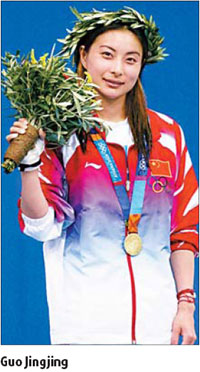Teammates' failed tests may keep Guo out of China Games
Diving diva Guo Jingjing will likely miss the China National Games after her provincial team was banned from the National Games in 2009, state media reported yesterday.
Two of Guo's teammates on the Hebei provincial team, Zhang Jun and Gao Lin, tested positive for prohibited substances following the National Championships in March. As a result the team will face a two-year ban from national competition on all levels, China's Internet portal Sohu.com said.
"The ban is very likely to make Guo unable to compete in the National Games and then force her to end her career after the Beijing Games," the website said. "The case will lead to some devastating effects to Hebei, one of the elite diving teams in China."
Zhang won a silver medal in women's 1m springboard and a bronze in the 3m event at the National Championships, also an Olympic qualifying tournament, and Gao finished with a bronze in the 10m platform.
This is China's first-ever drug case in the sport of diving, according to Sohu.com. Xin Evening Post, a newspaper based in Harbin, Heilongjiang province, claimed the prohibited substances were in diet pills the divers were taking to lose weight.
But a Hebei sports official denied the report.

"What nonsense, I've never heard of it," Li Fang, head coach of Hebei Team, told Sohu.com. "I don't know whether they took diet pills or not, but I am sure I haven't received any information about the case from Hebei Sports Bureau or the National Swimming Administrative Center."
Guo, the 3m springboard and 3m synchro gold medalist at the Athens Games in 2004, has yet to comment on the drug scandal.
Guo is at the peak of her career - she led China to a 1-2 finish in women's 3m springboard at the Canada Cup earlier this month and pocketed the 3m synchro gold with Wu Minxia a day later. She won two titles at the Mexico Cup as well last month.
With no more than 100 days until the Beijing Games, China has announced on many occasions that it is determined to send a clean team to the Olympics.
China has increased its number of tests, from 165 in 1989 to last year's 9,424, 74 percent of which were conducted out of competition.
In 2007, China further upped its effort to fight doping on the provincial and national level.
Early in the year, Chinese authorities signed agreements with provincial sports bureaus holding them responsible if athletes from their provinces tested positive in doping tests.
In May, the state council approved the creation of the China Anti-Doping Agency, an independent government anti-doping department that conducts tests and promotes research. It will carry out some 4,500 tests during the Beijing Olympics in its official lab.
China Daily
(China Daily 05/13/2008 page22)








